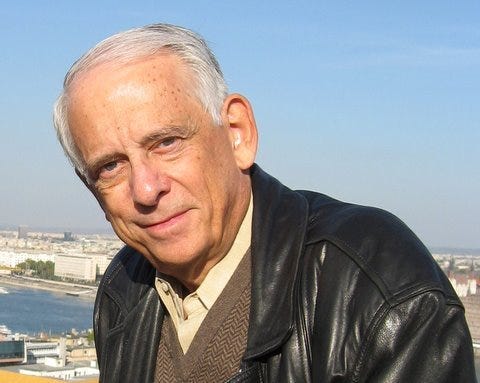What a turn of events! It has not been a good week for Russia.
Putin lost ally Syria and got the fleeing former Syrian dictator and erstwhile strongman Bashar al-Assad as a consolation prize. And to be sure, Bashar al-Assad isn’t much of a prize. The Syrian bully, who will never again show his face in Damascus, is now simply an expensive and expendable guest with which Putin is, for the time being, playing host. Bashar al-Assad is welcome nowhere other than Russia, and one can assume his welcome there will rapidly wear thin. Given the celebratory outpouring in Damascus over al-Assad’s swift and unscheduled departure, no one is going to miss him other than, perhaps, his pal Tulsi Gabbard should she again visit Damascus as President-elect Donald Trump’s Director of National Intelligence.
It is still unclear what the toppling of Bashar al-Assad by Hayat Tahrir al-Sham (HTS), which the United States lists as a terror organization, will mean in Washington and Tel Aviv. Trading one terror group for another would seem to be a zero-sum game in which the fundamental problem for America and our allies remains, at this time, essentially the same. The establishment of a new government that may be as antagonistic to America and our allies as the deposed al-Assad regime doesn’t seem, as yet, to be anything to celebrate. Then again, HTS may see the fall of al-Assad as an opportunity to do business with America. It seems that an opportunity has emerged to reduce tension in the area. Given how the entire Syrian army seemed to melt away in the face of the assault by HTS, a new reality may be dawning concerning Israel and its Syrian neighbors. Israel has decimated the hated al-Assad regime’s capability to wage war. The relationship, if any, between Israel and HTS remains to be seen. Still, some observers seem cautiously hopeful that HTS, having overthrown al-Assad, has little interest in duking it out with Israel.
Israel, on the other hand, has lost no time in decimating much of Syria’s military capability to wage war. The chaos in Syria has represented an opportunity for Israel to pound Syria’s weapons stockpiles with complete abandon, and it has done so.
The Syrian Observatory for Human Rights reported this week that “Israeli warplanes continue to destroy what remains of Syria’s military arsenal for the fourth consecutive day since the fall of al-Assad.” The group says that over 352 air strikes have been carried out in 13 Syrian provinces, focusing on “warehouses, aircraft, radar systems, and military signal stations, scientific research centers and weapons and ammunition warehouses in different positions across Syria.” Israel reports it is targeting military infrastructure to guarantee its own security.
It seems Russia may have accepted that it has backed a loser. As we go to press, Russia has been dismantling military equipment in Syria and loading the munitions onto cargo planes, presumably headed back to Russia. U.S. satellites have reportedly captured images of Russian equipment being loaded onto large cargo planes. The extent of Russia’s withdrawal from Syria remains questionable. Given Russia’s immense buildup in the country, it would take considerable time to vacate Syria entirely. Abandoning Syria isn’t likely, but al-Assad’s fall leaves Russia with diminishing prospects there. Events on the ground during the past several days indicate that Russia has few friends in the country.
Dara Massicot, a senior fellow with the Carnegie Endowment for International Peace, reports that a Russian withdrawal is underway. With the HTS takeover of Syria, Russia may have no friendly host in the country. It is unclear what the rebels’ relationship will be with the United States, which had, long ago, labeled the group as a terrorist organization. Nonetheless, Russia, clearly allied with and now host to Bashar al-Assad, is an odd man out in Syria. As Austrian psychologist Fritz Heider taught, “The friend of my enemy is my enemy,” which is also a well-established principle in the Middle East. It is a principle that risks a confrontation between Israel and Russia. Israel sees the chaos and veritable civil war in Syria as both a game-changer and an opportunity to eliminate the threat from an old nemesis. It is not an opportunity that Israel is likely to ignore. HTS sees its war in Syria as a game changer for both Syria and its own rebel forces.
The leader of the Islamist-led rebels, Abu Mohammed al-Jolani, criticized Israel on Saturday for its incursion into southern Syria but said his country was too exhausted for fresh conflict.
While many Western nations, including the United States, Turkey, and several other allied countries, still view HTS as a Foreign Terrorist Organization, HTS has moved to distance itself from its terrorist past.
al-Jolani, this week, assured Syrian civilians that they had little to fear regarding the management of rebel-held areas in Syria. HTS says it is working to reassure civilians and groups that suffered persecution at the hands of extremist and jihadist groups in Syria’s decade-long civil war. The group says it has gone out of its way to publicly assure Christians and other religious and ethnic minorities that they will live safely under its rule.
Meanwhile, Iran has, for the time being, lost Syria as an ally and as a safe harbor from which to cause mischief. Iran’s so-called “axis of resistance” has been decimated by events of the past couple of weeks. It has lost most of its clout, and its “axis of resistance” is in tatters. Its proxies, Hezbollah and Hamas, have been neutralized mainly by Israel, further compromising Tehran’s ability to foment mischief.
It has not been a good week for the old guard in Russia, Syria, or Iran.
Please share our weekly commentary with others.
Of Thee I Sing 1776. Subscribe here:
Recent podcasts have featured my commentary on Liz Cheney’s book, “Oath and Honor,” as well as my commentaries regarding:
U.S. Representative Jim Jordan,
Brian Kemp and Those Republicans of Georgia,
The Trump Indictments,
The Fox Corp Settlement,
The CNN Trump Town Hall,
The Hunter Biden plea deal,
The New American Cult of Personality,
and my interviews with William Bratton, Retired Chief of Police in New York City, Los Angeles, and Boston;
Rikki Klieman, Attorney, Network News Analyst, and best-selling author;
John Thoresen, Executive Director, Barbara Sinatra Children’s Center;
Katherine Gehl, co-author of The Politics Industry and founder of the Institute for Political Innovation;
Jazz artist Ann Hampton Callaway;
Outlander author Diana Gabaldon;
AI Data Scientist Lawrence Kite;
Ryan Clancy, Chief Strategist of No Labels;
Former Senator Barbara Boxer;
Former Senator Joe Lieberman;
and former Maryland Governor Larry Hogan.
Novels by Hal Gershowitz





Enlightening.